I’m currently decluttering my house and came across this plaque at the bottom of a filing cabinet.
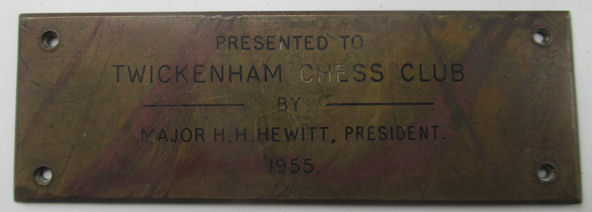
This was originally attached to an equipment cupboard at Richmond & Twickenham Chess Club (the two clubs merged in 1958). After becoming surplus to requirements it was used by Richmond Junior Chess Club for some time. After we stopped using it I decided I wanted to keep the plaque, resolving to find out more about the gallant and alliterative Major at some point.
And here we are. How do chess clubs choose their President? Presidents aren’t usually expected to do very much, just to provide an impressive name on your headed notepaper or, these days, on your website. Clubs might elect a famous player with connections to their club or area. They might also choose a local dignitary: perhaps the local MP or a prominent local politician. The President might also be a long-serving club member, or perhaps someone with the appropriate gravitas to represent the club to a wider public.
Major H H Hewitt wasn’t a famous player, nor did he appear to be a local dignitary. As the club (the third Twickenham Chess Club) had only been formed after World War 2, he wasn’t really a long-serving member. Perhaps his honour was a tribute to a distinguished military career.
In the past I’d tried looking for anyone of that name living in the Twickenham area, and then, looking slightly further afield, I found him in Hersham, south of Walton on Thames, west of Esher and Sandown Park racecourse. I’m sure you’d like to know more about him.
He was Harold Henry Hewitt, born on 18 June 1896 in Boston, Lincolnshire, the son of an Inland Revenue officer. The family seemed to move around a lot, possibly as a result of his father’s job. By 1901 they were in Oakham, Rutland before settling in Darlington, and in 1908 he was admitted to Darlington Grammar School. It’s not clear whether or not the family had split up by this point: in 1911 Harold, his mother and younger brother were in Darlington, while his father, now a supervisor for the Customs & Excise Department, was in London.
Harold, like many young men of his age, took the opportunity to serve his country, joining the Royal Field Artillery as a 2nd Lieutenant on 27 October 1915. On 1 July 1917 he was promoted to Lieutenant. He then met a Scottish girl, Georgina Gorrie, and they were married in Glasgow in 1919.
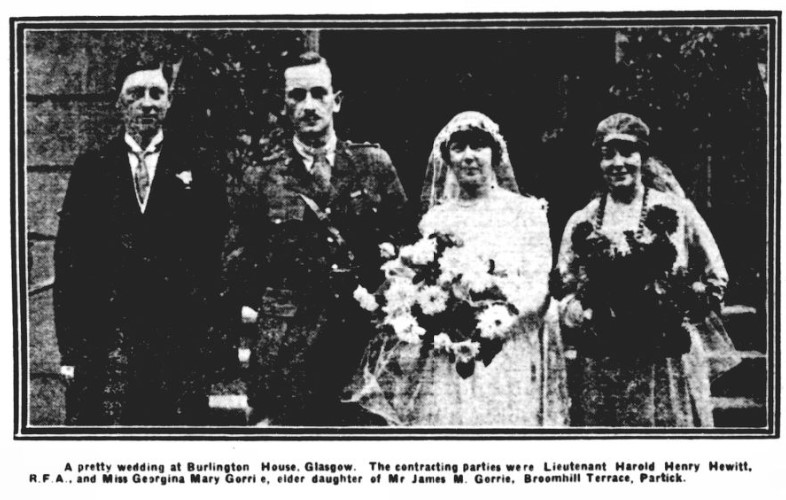
They soon moved to Edinburgh, where the 1921 Scottish Census found them, along with their 4 month old son John. They didn’t remain in Scotland long, relocating to Croydon where their twin daughters Joan and Muriel were born in 1925.
They were soon on the move again, this time to Colchester, where Harold swiftly ran up a string of motoring offences.
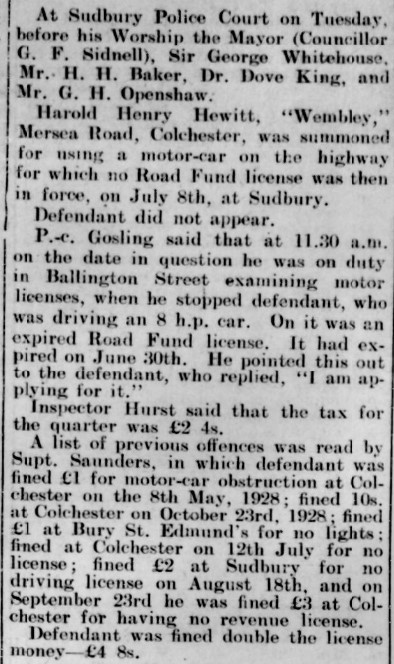
They moved yet again in 1934/35, to the newly built, and relatively modest, 1 Molesey Close Hersham, where Harold would remain for the rest of his life.
It’s not clear what his occupation was at this point, but he must have re-enlisted in the Artillery soon after the outbreak of war, rising to Captain and again to Major.
He wasn’t the only member of his family who saw service in World War 2. His son John joined the RAF Volunteer Reserves, becoming a Pilot Officer flying Lancaster bombers.
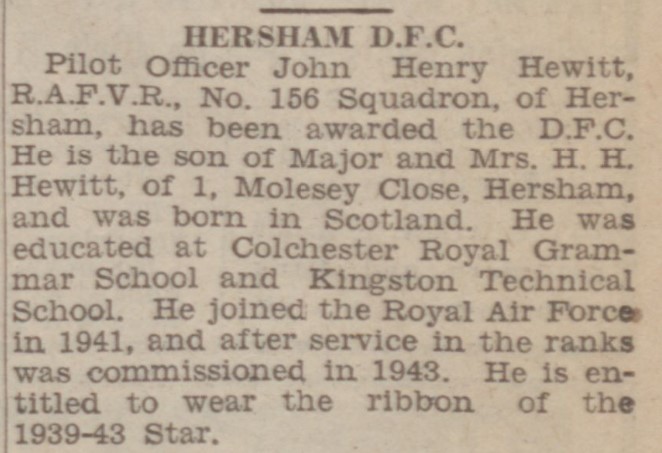
In only a few weeks he had risen to the rank of Flight Lieutenant, and, at 00:24 on 15 June, took off on a pathfinder mission for some of the 330 aircraft attacking the railway installations at Douai, Cambrai and St Pol. The plane was attacked by night fighters and shot down, with the loss of all crew.
Pilot: Flt Lt John Henry Hewitt DFC (23)
Flt Eng: Plt Off Vincent Brian Crosby DFM (33)
Nav: Plt Off Harry Louis Wilson DFC (27)
Nav: Plt Off Robert Lonsdale Clenahan DFC (23)
Bomb Aimer: Plt Off Denis Flynn DFC (31)
WOp/Air Gnr: WO Walter Smith DFC (21)
Air Gnr: Flt Sgt Gilbert Valentine (Tony) Cottrell (23)
Air Gnr: Flt Sgt Albert Bouch DFM (21)
After the crash Major Hewitt sent a personal letter to the parents of the other crew members. As of 2010, the letter to Tony Cottrell’s mother was still in the family’s possession.
Information taken from WW2Talk.com (here) and AircrewRemembered.com (here).
You can only marvel at the courage of aircrews such as this one. Harold Hewitt’s gesture in writing to the other families suggests a man with a considerable generosity of spirit, rather in contrast to the man who, a decade or so earlier, was driving around Essex and Suffolk like Mr Toad, seemingly believing that he was above the law.

Here’s John’s probate record from 11 June 1945 (a year after his death). You’ll see that Harold is now described as a company managing director, so he must have left the Royal Artillery again by this point. I have no information as to the nature of the company he managed: perhaps it was something to do with furniture.
After that day, which must have changed his life, we have little information about Harold. We catch a glimpse of him in 1948, as Treasurer of an organisation (probably of local businesses) providing financial support to youth organisations in Hersham. He would, I suspect, have been pleased then that his cupboard was later used by Richmond Junior Chess Club.
I’ve only managed to find one reference to him as a chess player, in this match against Hastings from 1954, which you might recall having seen before in this Minor Piece.
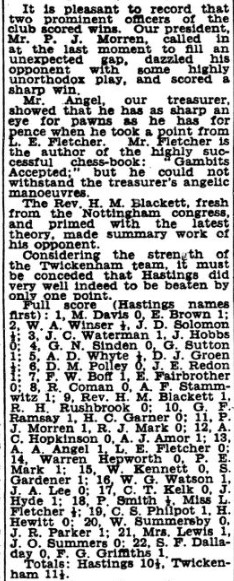
He played on Board 19 of 22, losing his game, which suggests he wasn’t an especially strong player. But no matter. He must have been a well respected member of Twickenham Chess Club to have been appointed President.
Perhaps he joined the club on its foundation soon after the end of the war, or maybe he was a more recent member. You might also ask why he chose Twickenham Chess Club. There weren’t any major clubs very close to Hersham, but I’d have thought Surbiton or Kingston, for example, would have been an easier journey. I’d like to think that playing chess offered him some consolation after the death of his son.
I don’t know how long he remained a member of Twickenham Chess Club, or whether he continued his membership when it amalgamated with Richmond Chess Club. I don’t recall ever hearing his name mentioned.
Harold died on 5 June 1966, just before his 70th birthday. Here again is his probate record.

Georgina later moved to nearby Byfleet, dying in 1974. Their daughters, Joan and Muriel, both had children and grandchildren. If anyone from the Hewitt family reads this I’d be happy to return the plaque to them, with gratitude for the service Harold’s cupboard provided over many years to both Richmond & Twickenham and Richmond Junior Chess Clubs.
Like many of his generation, Harold Henry Hewitt served in two world wars, in his case in the Royal Artillery. As he continued to use his military title he must have been proud of his war service. His only son, a member of the Royal Air Force Volunteer Reserve, showed exceptional skill and bravery as a pilot, losing his life in active service.
Reading a story like this I’m always reminded of Lord Dunsany’s poem (British Chess Magazine April 1943).
One art they say is of no use;
The mellow evenings spent at chess,
The thrill, the triumph, and the truce
To every care, are valueless.
And yet, if all whose hopes were set
On harming man played chess instead,
We should have cities standing yet
Which now are dust upon the dead.
Sources and Acknowledgements:
ancestry.co.uk
findmypast.co.uk/British Newspaper Library
Forces War Records
Scotland’s People
